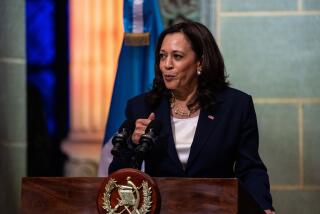Cheney Visits Asia to Bolster America’s Ties
Vice President Dick Cheney arrived here Saturday to begin a weeklong visit to Japan and South Korea, two key allies; and China, a growing power that has become an unexpectedly close U.S. diplomatic partner.
U.S. officials said Cheney’s trip, his first to East Asia in more than three years as vice president, was aimed at shoring up American relationships in the area. His agenda includes issues ranging from Iraq -- to which Japan and South Korea have sent troops -- to North Korea.
“We’ll try to move everything forward,” said a senior official involved in the trip.
He added that Cheney wasn’t aiming for any breakthroughs on individual issues. “That’s not the purpose of the trip. It’s ongoing management of all these relationships.”
But if Cheney is hoping for calm conversation about long-range issues, he is likely to find events intruding.
Japanese Prime Minister Junichiro Koizumi is facing a potential political crisis over Iraqi militants’ seizure of three Japanese civilians. China is preoccupied with Taiwan, where President Chen Shui-bian just won reelection on a platform that called for moving toward formal independence from the mainland. And Cheney will be landing in Seoul on South Korea’s parliamentary election day -- to meet with an “acting president,” because impeachment proceedings against President Roh Moo Hyun are underway.
Cheney wasn’t scheduled to meet with Koizumi until Monday morning, but an aide said the vice president might talk with the prime minister before then to express support for Japan’s refusal to negotiate over the hostages.
The hostage seizure is “a classic case ... [of] trying to change the behavior of governments through terror,” said the senior official, who briefed reporters on Cheney’s plans on condition that he not be identified. “It’s important that those of us who are working on this overall effort not allow that to happen.”
Even before the hostage seizure, Iraq was a controversial issue for Koizumi, who decided last year to send about 550 Japanese noncombat troops to assist the U.S.-led occupation force there -- the first overseas deployment of Japanese troops since World War II.
“That was a huge step ... and it wasn’t very popular,” said Joseph A. Massey, a Japan expert at Dartmouth College’s Tuck School of Business. “How is the public going to react when the first Japanese gets killed?”
Cheney will thank both Japan and South Korea for sending troops, in hopes that the praise will help both governments’ public standing, an aide said.
In all three countries, the vice president will discuss the problem of communist-ruled North Korea, which has said it is resuming production of the plutonium used in nuclear weapons.
The United States has joined with China, Japan, South Korea and Russia in six-nation negotiations to urge North Korea to halt its nuclear program and dismantle any weapons it has built. But the most recent round of talks deadlocked in February.
U.S. and Asian diplomats say they don’t expect any breakthroughs soon, in part because North Korea appears to be waiting to see how the U.S. presidential election turns out before making any deals.
As a result, Cheney’s aim in effect is to keep China, Japan and South Korea in line with the U.S. policy of rejecting preemptive concessions to the North.
“We’ve got to keep working the problem,” the senior official said. “It’s 3 yards and a cloud of dust. There’s no touchdown pass here.”
The focus of Cheney’s journey, however, will be his 48-hour midweek visit to China.
Cheney and President Bush came into office in 2001 arguing that former President Clinton had been too easy on China, and declared Beijing a “strategic competitor” to the United States, not (as Clinton had put it) a “strategic partner.”
Three years later, U.S.-China relations have turned unusually cordial. China has broadly supported Bush’s war on terrorism and did not actively oppose the invasion of Iraq. Beijing has become an important partner in the North Korea talks. And even on Taiwan, China and the U.S. have found grounds for agreement: Both want to dissuade Taiwan’s president from sudden moves toward independence.
“I think the relationship is better today than it was three years ago,” the senior official said. “They have been good for us to work with on important issues like the North Korean nuclear problem. That doesn’t mean we don’t have differences; we do. But we address those in a frank and forthright manner.... I think the relationship is good.”
On Taiwan, Cheney will seek to walk a fine line. China wants Washington to say clearly that it opposes any move toward independence by Taiwan. Recent administrations, including Bush’s, have stopped short of that, saying merely that they oppose any change in the status quo. Some U.S. conservatives want the administration to be more vocal in its support for Taiwan.
Taiwan remains “the most important problem in [U.S.-China] relations,” He Yafei, director of North American affairs at China’s Foreign Ministry, said last week. “The question bears on China’s sovereignty and territorial integrity.”
Cheney’s response is likely to leave both sides disappointed -- and U.S. policy about where it was: “We are opposed to unilateral efforts to change the circumstances in the Taiwan Strait, on either side,” the senior official said.
China will also pressure the U.S. to end weapons sales to Taiwan, scholars said. Cheney will make no such pledge, officials said, though experts note that Taiwan’s arms-buying has slowed for economic reasons.
Other issues likely to arise include human rights, China’s attempts to control the pace of reform in Hong Kong, economic and trade issues, and terrorism.
But even on issues that have long divided the two countries, the United States and China are finding more points of agreement and more ways to minimize their disagreements, officials and experts said.
“Chinese policymakers since mid-2001 have endeavored to avoid serious confrontation and conflict with the U.S. administration, leading to broadening of common ground between the two powers and a marked improvement in bilateral relations,” said Robert Sutter, an Asia expert at Georgetown University.
The vice president is to meet with Koizumi on Monday and with Japanese Emperor Akihito on Tuesday. Cheney will spend Wednesday in Beijing, Thursday in Shanghai and Friday in Seoul before returning to Washington.
*
Times staff writer Mark Magnier in Beijing contributed to this report.
More to Read
Get the L.A. Times Politics newsletter
Deeply reported insights into legislation, politics and policy from Sacramento, Washington and beyond. In your inbox three times per week.
You may occasionally receive promotional content from the Los Angeles Times.







